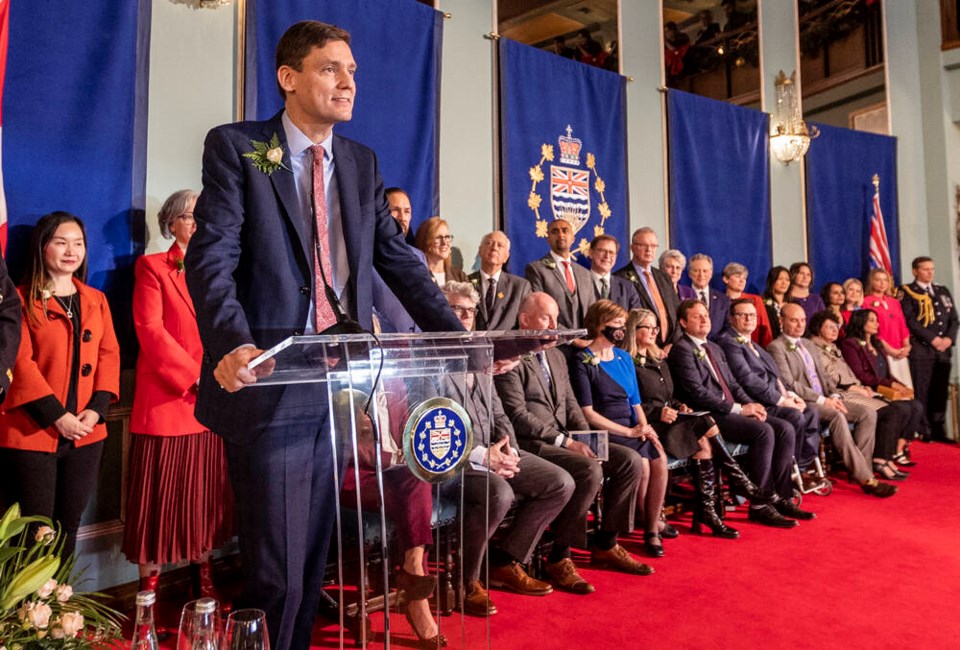The NDP government has such an outlandishly large surplus that Premier David Eby had to name four more cabinet ministers on Wednesday to help spend it.
The $5.7 billion bonanza that was declared last month represents an $11.2 billion swing from what was forecast in February. It sparked speculation that Eby was going to call a quick election next year to capitalize on it.
He’s not.
“I don’t know how many times I can say it. I am committed to a fixed election date (meaning October 2024).
“I didn’t hear one British Columbian say: ‘Gosh what I really hope happens now is a provincial election.’ ”
What that surplus is going trigger is a spending blitz by a newly bulked-up team to dampen down the assorted crises enough that two years from now Eby can put his leadership to a vote (for the first time).
Past premiers used to crimp their lineups slightly just as a nod to restraint. But with the pre-Christmas surplus gift unwrapped, all worries about cabinet bloat faded away Wednesday as he named 27 ministers, bumping up the size by four. It’s one of the biggest in provincial history.
The new 28-person lineup filled up most of the stage in the Government House ballroom. It is now in the Ontario and Quebec size range, and three more than Alberta has. Eby’s cabinet is just one shy of the B.C. Liberal and Green caucuses put together (a ratio he’d like to maintain).
One move in the elaborate game of musical chairs stands out. Former jobs, economic recovery and innovation minister Ravi Kahlon is now housing minister, which is a standalone ministry.
He was well-regarded in the previous role, which partly involved scrambling together pandemic assistance programs and doling out the money. The new job will be a much tougher gig for the Victoria-raised, two-term Delta North MLA.
It’s been two weeks since the NDP jammed two housing bills through the legislature on short notice with minimal debate.
But the arguments are just starting, particularly in thousands of strata councils where condo life could change dramatically as rental restrictions lift on pre-2010 buildings.
Eby, who lives in a strata building himself, said any significant housing policy changes create anxiety, but the government will provide support to address any issues that come up.
“Part of ensuring buildings and community remain livable is recognizing the fact that we are in a really serious housing crisis and we can’t leave any housing on the table.”
Eby said there is now a decade of experience in post-2010 buildings with no rental restrictions. “Those strata buildings are functioning just fine.”
Lifting the restrictions on older buildings is aimed at filling thousands of vacant condos around B.C.
“We need them to be able to be rented out.”
Kahlon, who is taking on the problem that Eby spent two years holding responsibility for, said his marching orders are clear.
“He’s made it clear to me that he has been moving at an aggressive pace, and I need to move at that pace with him.”
The new bills impose new pressures on municipalities to approve housing or be overridden by the province.
Kahlon said: “We have to get housing done faster. … It’s going to require us to speed up our process.”
He said stakeholders want to get it right and he will meet as many of them as possible.
Eby’s mandate letter to Kahlon states: “Demand for housing has never been higher in our province — and supply is not keeping up.”
He ordered that progress be made on all facets of the housing problem. “While expanding our work to build housing for those living in the parks and on sidewalks, we must take strong steps to get involved in delivering attainable middle-class housing.”
Kahlon is expected to ensure timely resolution of tenancy disputes, to establish a rental housing acquisition fund, legalize secondary suites province-wide and develop a flipping tax, among other things.
Economic forecasts were refreshed last week and now show growth will drop dramatically in the next two years.
So the big cabinet will have big money to spend, but over a short period of time, before the remaining surplus is put toward debt by law.
That will heighten the urgency all around.
>>> To comment on this article, write a letter to the editor: [email protected]



